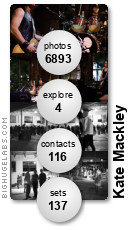Flickerstick came back home to
Only six years ago, when Deep Ellum bands played to packed venues, when the music scene wasn’t fractured into cliques, there rose a band called ‘Flickerstick’ for no good reason. Then they got famous with their friends, Tripping Daisy, the Toadies, and The Spree, and took it all away with them. Back at the Lakewood Theater for their Tarantula CD release party, DMG sat down with Brandin Lea, Rex Ewing, Fletcher Lea and new drummer, Todd Harwell, formerly of Doosu. We even caught up with Cory Kreig a little later. Relaxing in the obscenely florescent lighting backstage, the guys of Flickerstick were mellow and looking forward to their hometown crowd, even if that meant sharing a couple extra beers with their friends.
Brandin Lea: ‘Accessible?’ You think that?
DMG: You tell me.
BL: I haven’t heard anyone say that. I don’t know if we’re accessible.
Rex Ewing: Maybe the first record, I don’t really think this new one is.
Tarantula is a little more intricate than the first record was. I don’t know. It’s nice that we’re called that, but I’ve never heard that.
DMG: Your fans want to know when you’re touring again.
RE: We just got back; we were gone for a month. We just got back a week ago. We toured the eastern half of the States in October and we’re about to do a few West Coast dates next week. Actually, until January we’re just playing regional, then Florida.
RE: Somewhere it’s not cold!
DMG: It’s mainly your
RE: (laughs) Tell them to send tickets!
BL: As soon as possible!
RE: It’s expensive to tour the U.K., to get all the… It was easier before, before the restrictions with airlines, but as far as getting your stuff over there it’s hard. It’s not even your amps or anything. They charge you for extra weight now; ten times more than they used to, so it’s just phenomenal to get the equipment over there.
DMG: Tell me about Flickerstick as a band. Describe your sound.
RE: Uh, Brandin? What is your sound?
BL: Man! (shakes head) I have no idea. I know that’s a ridiculous answer, but… It’s melodic, it’s rock, it’s unique, it’s… got some theateresque parts.
Fletcher Lea: I’ll go with alternative rock.
BL: Mainly I write songs that are all over the place. I don’t really know. I’ve asked that question a lot and some bands can go ‘we’re metal’ or ‘we’re this,’ ‘we’re that;’ we dabble in a lot of different areas.
DMG: You have fans that run from hardcore to indie to pop. I’ve seen you listed on blogs where the other bands are all Foo Fighters or U2 or Skinny Puppy. Where do you put yourselves in that mix?
BL: I never considered us a pop band. The closest we’ve gotten called is psychedelic pop. I’m more for that term than just … Pop bands to me are like that Ryan Cabrera, that’s a pop band. To be a pop band, we’d need more dancers. You know, I never knew anything about that guy- the first thing I knew about him was how he did his hair. (laughs) That was the very first thing I got, then his guitar. He does have great hair. And the second thing was that his girlfriend was Ashlee Simpson.
RE: Nothing about his music.
DMG: Any local bands you’ve been hearing buzz about?
BL: Black Tie Dynasty, Radiant* -they’re playing with us tonight, Red Animal War.
DMG: Which song on Tarantula is indicative of the direction Flickerstick will follow in the future?
BL: Every album should be different, and this album as whole speaks for itself.
DMG: The future of music looks like no more radio. How do you think bands will get in front of fans?
RE: The radio sucks; all ClearChannel stations play the same song all day long.
BL: The internet is a positive for bands. So many are able to get heard. But young 14- and 15-year-old listeners have short attention spans; they buy four or five songs that they like, where we used to follow the bands that we really liked over years. We’d buy everything they put out. Now the kids are bombarded with so much music that a band’s shelf life is shortened. There are way too many bands you can dive into next week. The younger fans’ attention span is so short. There’s always something new.
DMG: Bands on the Run was a blip of popularity on your steady rise. Do you see it that way, did you expect more?
BL: BOTR was three and a half years ago, I don’t remember it.
RE: Christmas is my favorite time.
BL: We got word of mouth from fans that saw the show.
DMG: What’s the plan for the future?
BL: Making good music, continuing to play. The band is what it is; anything else is out of our control and it’s handled by people who help, or not. That’s how it goes. We’re a band that likes to tour and put out records. Any more than that comes from others and is out of our control.
DMG: How was working with Keith Cleversley (producer for Tarantula and Mercury Rev, Flaming Lips)?
BL: He’s good at what he does. It was an interesting experience, a battle, but that’s what producers do.
DMG: You’re shedding and adding musicians and crew, not to mention management and record labels. What’s up?
BL: With Dom, everyone knows about that. And we fired our manager and that was our decision.
RE: Blood sucking leeches! They should die and burn!
BL: I wish it wouldn’t be that way. Not everybody gets along together.
DMG: Your lyrics have been described as ridiculous.
RE: Yeah? Bunch of haters.
BL: Sometimes there’s a hint of that. No more than 90%. I’ve tried not to write clichés and something out in left field. “Catholic Scars and Chocolate Bars” is ridiculous if you don’t know the meaning behind it.
Fletcher Lea: “Milk Shake”; that’s not a good song.
BL: Though supposedly the reviews (of Tarantula) have been positive.
RE: Tarantula- you gotta buy it. Say to all fans it’s the best record.
DMG: Thanks guys!
Brandin, Rex, Todd, and Fletcher left after their early soundcheck and about an hour later, Cory Kreig wandered in, dressed in a German army jacket that was the rage of the 80s and old cowboy boots. We had a few minutes to chat backstage before he joined the rest of the band….
DMG: Is it good to be home in
Cory Kreig: Yeah, it’s good, um, fun and nice. Good, fun, nice. (laughs) Great answer, right?
DMG: You’re having your CD release in
CK: We technically had a CD release there as well. We’ve had a few. This is just the
DMG: Anything different about this one?
CK: Yeah, more people are backstage drinking our beer here.
Manager Troy Ostensen wanders in and surreptitiously stares at a little bald nick in Cory’s closely shorn hair.
TO: Do the mohawk yourself?
CK: Yeah, thought I’d make it easy with the clippers.
TO: You got a little close in a spot.
CK: OK, stop looking at it, dude.
DMG: Have you heard of any good local bands?
CK: Locals? No, we’re not around here very much, with touring. The only time we’re ever in a bar is when we’re paid to be. In ’98 we were playing our first shows and Tripping Daisy, the Toadies, bands like that were around. We were playing six years ago. Now what we’re seeing is that not as many people go out as used to, generally. We’re seeing that everywhere, all over country. Even well-known bands that open for us in their hometowns have no attendance. When we were here, everyone was playing Deep Ellum. It was packed every night of the week with good bills, good attendance. There wasn’t as much crime then.
DMG: What’s your plan for the next five years?
CK: Retirement? (laughs) No, I have no idea.
DMG: Your fans want to know what kind of casseroles you like. They want to feed you on tour.
CK: Yeah, people bring us a lot of food. They think we’re hungry; I don’t get that. (laughs) It’s not like we’re emaciated or anything. Anything’s great. You need to eat. As long as it’s made with love, that’s the most important ingredient in music as well as casseroles, right?
DMG: Have you grown as writers and what direction do you see Flickerstick going?
CK: As songwriters? I’d like us to be recognized, by the Grammies, the American Music Awards. If you don’t say that, what’s the point? You’re the next Richard Marx – he’s got a new album coming out- but I need to curtail my remarks.
DMG: I’ll ask you the same thing I asked Brandin and Rex before; your music has been described as ‘accessible.’
CK: Yeah? Well, not many people are accessing it. I mean, the internet is accessible; our music’s not so accessible.
DMG: You think that the internet is the future for music?
CK: The internet saves bands. Radio is owned by two companies and they pick what goes on it.
DMG: Do you consider yourselves outside of radio?
CK: Well, we’re not on it. I’d like for our songs to be on the radio, but that’s a crap shoot these days.
DMG: Is the internet how people get introduced to Flickerstick?
CK: We’ve moved beyond introductions, at least I hope so.
Cory headed off to find the rest of the band after passing along some tips about chicken tetrazini and lasagna. After all, touring isn’t just about chocolate bars, beer, and trail mix. Flickerstick, while preferring the warmer states this winter, will most likely be somewhere near you, sometime soon.







No comments:
Post a Comment